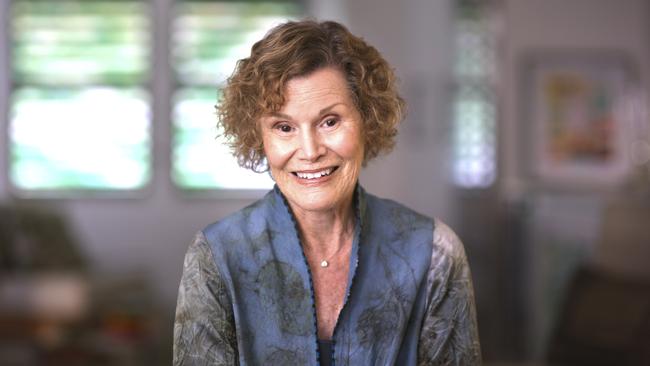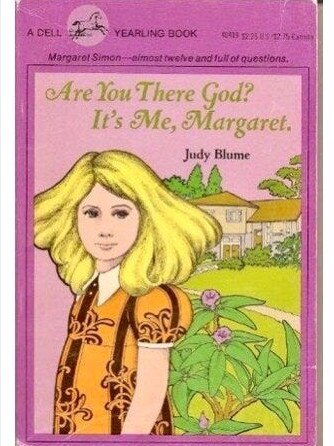Judy Blume Forever documentary sparks resurgence
The author who captured teenage angst, and all of its joy, is having a resurgence, courtesy of a brilliant documentary and the first film adaptation of her most iconic work.

It’s quite possible I owe a fine to the Burnie Library from circa 1996 due to over-borrowing Judy Blume’s Forever. For one, I couldn’t get my hands on it at my small religious school where sex-ed basically amounted to being shown a very 1970s movie of an extremely natural birth which was truly enough to put most of us off sex for life. (Which was, of course, the point.)
The book, first published in 1975, is about 18-year-old Katherine and Michael who fall in love and have sex. Katherine loses her virginity to Michael and it’s a big deal, but maybe more importantly, it’s not the biggest deal. As Judy Blume says in the recent documentary Judy Blume Forever, she wanted to write a book where having sex wasn’t something that could ruin your life. It also doesn’t have to define it either.
For months, as a bookish girl on the cusp of everything, desperate to finally get my period, I stashed Forever under my pillow and read it inside other books at the breakfast table. Like the other Judy Blume books I’d devoured, such as Are You There God? It’s Me Margaret (now a film starring Rachel McAdams, coming to cinemas in Australia soon) and Deenie (the obsession with the glamour of a brace for scoliosis remains), the book felt like a friend.
Re-reading it recently as a 30-something mother of two, I’m struck by how true, and almost voyeuristic, it feels in capturing all of the awkward bumbling and longing and worrying of teenagehood. As a tween, I found the ending of Forever, where a summer apart changes things for the couple, unbearably and intoxicatingly tragic. But being an adult with some idea of disappointments and heartbreak and the way life goes, is to know that you can have intense feelings and experiences with someone who, one day, might be someone you bump into and say, “Well, see you around.” Someone might have given you their whole heart, but later only a little piece that you carry with you remains.
The books are a little dated. Remember all the sanitary pads with belts, or the fact that most of the mothers don’t work (and are much younger than many mothers today — it is strange to now be the same age as the mothers in the books who have teenagers and play bridge on a Thursday morning), and people talk on the telephone all the time. But the themes – the agony of growing up, of wondering if you’re “normal” and if people will like you, of puberty and masturbation (“special places!”) the crush of parental expectations and the idea that you can be complicated and messy but fundamentally good — remains.
As one author says in the recent Prime Video documentary Judy Blume Forever, the books weren’t meant to be timeless, they were timely. But in the end, they did become timeless. How to be a person, the author’s perennial preoccupation, remains an eternal question. The documentary is a reminder of how Judy Blume was revolutionary and brave (indeed her books were banned in some parts of the US) for putting all of the secret worries, obsessions and desires felt universally by young people into words. So much work that captures the horny and irrational sweetness of growing up now, from Netflix’s Sex Education to Mindy Kaling’s Never Have I Ever, was built on what Judy Blume created.
The adoration of Judy Blume — as noted in the documentary, it is practically impossible to talk about the author without stating her full name — is evidenced in many ways. This includes the coterie of stars who speak on camera, from Lena Dunham to Molly Ringwald, to the people who cry when they meet the author in the Florida bookshop she opened in 2016 and the kids from all over who wrote her letters about their most secret feelings.
When I bring up the writer with a friend and his boyfriend over lunch, he says that Forever, discovered as a boy growing up in a small village in Yorkshire, was one of his sexual awakenings. “Ralph!” he adds after a beat, with a wicked grin. (If you know, you truly know.)
For Jessica Stanley, a London-based Australian writer, author of A Great Hope and the mother of two daughters and a son, that Judy Blume was able to express the kinds of things girls often kept secret has been a source of comfort.
“I was gripped by [Are You There God? It’s Me, Margaret] because I was obsessed with any book back then written in the first person or diary form. Girls crave to know how others feel and live,” she says. “Taking my girls (aged eight and nine) to the film was so joyful and fun. They saw Rachel McAdams as Margaret’s mum be genuinely excited about Margaret’s puberty, and because I was excited and moved by the film, they knew I’d be happy about and receptive to the changes still to come in their own lives,” she says.
“I don’t know if I would be the same woman I am now without that early influence of Judy Blume”
“So far, my daughters aren’t burdened with shame about anything to do with their bodies or perfectly normal feelings. It could be my wonderful parenting, but more likely it’s the legacy of Judy Blume, women artists, activists and teachers who brought girls’ experiences into the open.”
Kimberley Allsopp, author of Love and Other Puzzles, book publicist and mother of two daughters, agrees that Judy Blume is a guiding light.
“I don’t know if I would be the same woman I am now or whether I’d be lucky enough to have the friendships that I have without that early influence of Judy Blume. At an age where you are an outsider to everything – including yourself – she brings you in as an insider. It’s impossible to put a value on the feeling of belonging, especially at a time where you don’t feel like you even belong in yourself,” she says.

It’s also never too late to come to Judy Blume. For Laura Brading, co-founder of book subscription service WellRead, the author formed what she calls her “re-adolescence”.
“I came to Judy Blume a little later than most. Realising I’d missed some rather canonical teenage texts, I sought out Judy in my early 20s. And you know what? I’m not mad about that. We know about ‘reparenting’ but have you heard of ‘re-adolescenting’? Okay, I made that word up, but it was a beautiful thing having Judy’s generosity and compassion with me during a time in my life when I couldn’t afford myself the same grace. And that’s what we all love about Judy … Her honesty and her understanding and her inherent goodness,” she says.
“She makes us feel that, despite all of the confusing and scary and uncontrollable parts of ourselves, we are still good people. I’m counting down the years before I can strategically place her books around the house for my kids to stumble upon.”
So really, for everything Judy Blume gave me, most of all the feeling of not being alone, any potential library fine was worth it.
Judy Blume Forever is streaming now on Prime Video. Are You There God? It’s Me Margaret will be in cinemas soon.
This article appears in the September issue of Vogue Australia, on sale now.

To join the conversation, please log in. Don't have an account? Register
Join the conversation, you are commenting as Logout